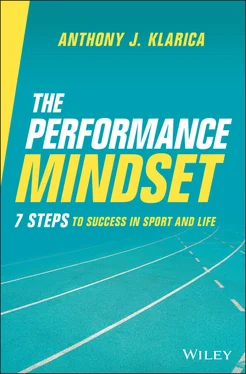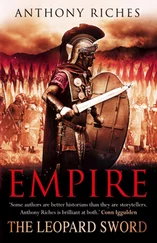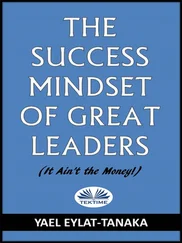Anthony J. Klarica - The Performance Mindset
Здесь есть возможность читать онлайн «Anthony J. Klarica - The Performance Mindset» — ознакомительный отрывок электронной книги совершенно бесплатно, а после прочтения отрывка купить полную версию. В некоторых случаях можно слушать аудио, скачать через торрент в формате fb2 и присутствует краткое содержание. Жанр: unrecognised, на английском языке. Описание произведения, (предисловие) а так же отзывы посетителей доступны на портале библиотеки ЛибКат.
- Название:The Performance Mindset
- Автор:
- Жанр:
- Год:неизвестен
- ISBN:нет данных
- Рейтинг книги:3 / 5. Голосов: 1
-
Избранное:Добавить в избранное
- Отзывы:
-
Ваша оценка:
- 60
- 1
- 2
- 3
- 4
- 5
The Performance Mindset: краткое содержание, описание и аннотация
Предлагаем к чтению аннотацию, описание, краткое содержание или предисловие (зависит от того, что написал сам автор книги «The Performance Mindset»). Если вы не нашли необходимую информацию о книге — напишите в комментариях, мы постараемся отыскать её.
The Performance Mindset: 7 steps to success in sport and life
The Performance Mindset: 7 steps to success in sport and life
The Performance Mindset — читать онлайн ознакомительный отрывок
Ниже представлен текст книги, разбитый по страницам. Система сохранения места последней прочитанной страницы, позволяет с удобством читать онлайн бесплатно книгу «The Performance Mindset», без необходимости каждый раз заново искать на чём Вы остановились. Поставьте закладку, и сможете в любой момент перейти на страницу, на которой закончили чтение.
Интервал:
Закладка:
When Matthew was 19, one of the greatest players in table tennis history, Chen Xinhua, from China, moved to England and became his coach. Matthew's new practice regime bore no relation to what he had seen or experienced previously, or even imagined. This ‘quirk of fate’, as he describes it, contributed to his ongoing development and fuelled his passion to strive harder.
Sometimes luck plays a role in sporting success. Meeting the right person at the right time may be all that is needed. Not working with a particular coach can be attributed to bad luck as much as bad choices. Working with a coach who has faith and is supportive can be due to luck or choice. It's a fine line between the two. Picking up an injury that limits opportunity can be just bad luck rather than bad management. A talent scout watching a game or event that happens to produce a standout performance is the kind of good luck that can go a long way to launching a sporting career.
These studies and stories emphasise that there is no single path to development. Playing a variety of sports at an early age to build engagement and enjoyment, maximising motivation and early development of mindset, is likely more important than is typically appreciated.
Patience and persistence
Aerial skiing is a complex sport. It is also one of the more challenging sports for Australians to excel in, given how much the climate limits opportunities for time‐on‐task in the snow (although water jumps play a big part in specific aerial training). Our geography likely contributes more to our international performance in swimming than in skiing, compared with, say, Switzerland, where the conditions are reversed. It's not about talent, but opportunity. In addition, minimal attention and few role models in the sport limits potential extrinsic motivation to become involved or excel in winter sports compared with other sports. So for Jacqui Cooper to become one of Australia's greatest Olympians and the first Australian woman to make five Olympic Games was a feat par excellence.
When I spoke to Jacqui about her journey she told me, ‘If you had to rate my talent it would have been zero out of 100. And that wasn't just my opinion — the coaches and administrators agreed!’ Such was her reputation that, in 1999, after being freshly crowned world champion and world number one, she was asked by a coach to speak to a group of young female athletes and give them some inspiration. Upon introduction, one of the girls in the group politely enquired if she could ask a question. ‘Sure,’ Jacqui replied, thinking it would be about one of her achievements. Rather, the query was ‘Are you the acrobatic moron?’ The junior was Lydia Lassila, who became a training partner and teammate and progressed to win gold ahead of Jacqui 11 years later at the 2010 Winter Olympics. ‘We still laugh about it today,’ Jacqui said.
‘You can have talented people, but in my sport, if they don't have a capacity to take some risk, they won't achieve,’ she explained. ‘I was a risk taker. I also loved acrobatics. And I did work hard.’ Growing up, she recalls, she had no training as a gymnast and didn't focus on any specific sport. She tried different things but wasn't necessarily good at anything. ‘Mum and Dad were busy, with me being a triplet, so weekend sport didn't happen much. We didn't even have a trampoline. What I did have was lots of energy — Dad used to call me an energy ball — and whenever I could I would go to a friend's house or the trampoline centre to play,’ she said.
Then, in 1989, Jacqui met Geoff Lipshut, the current CEO of the Australian Winter Institute and the chef de mission for the 2022 Winter Olympics in Beijing. ‘He's a blend of Mr Myagi from The Karate Kid and Yoda from Star Wars ,’ Jacqui recalled. ‘He literally saw me jumping on a trampoline that was next to the road when he was driving past. He was in the area to visit another athlete. The next day he met my parents, and that started my journey in aerial skiing. I was 16 years old. He put forward a 10‐year plan, and 10 years later he was there when the plan was achieved.’
Lipshut also nurtured the development and careers of Kristie Marshall, Alisa Camplin and Lydia Lassila, who all competed for Australia. Lassila was in a transition program for people leaving gymnastics who might be interested in aerial skiing. He happened to be at the Royal Melbourne Show one day and saw Alisa Camplin playing on a trampoline. Again he asked her parents if she might be interested in aerial skiing. Camplin went on to win an Olympic gold ahead of Jacqui at the 2006 Winter Olympics. If not for those lucky encounters, I wonder if Jacqui or Alisa would have gone on to become the athletes they did.
‘I was able to do only about 40 hours per year at the snow, so the first two years were slow growth with skiing. I got encouragement from others to keep going. I didn't back myself at all. What I did have was a place to direct my energy. It took me five years before I could land a jump.’ After she left school, Jacqui went to Colorado to pursue her development. ‘At the start I couldn't keep up with any of the athletes, so I skied with holiday makers and was even getting tips from them.’
Each of these aerial skiers followed a unique path that wasn't based solely on physical talent. They started out with a degree of talent and different experiences, but mindset enabled their persistence. Jacqui broke no junior records and was not a high achiever in any sport. She played multiple sports as a junior, but drew on an intrinsic passion, patience and energy, as well as the support and encouragement of others.
Early bolters and late bloomers
One of the many sports I have worked in over the years is swimming. Swimming clubs and squads include a wide mix of athletes with diverse motivations, from general fitness to social connections and Olympic aspirations. During adolescence, when many of their peers enjoy sleeping in, swimming squads begin training before school when it's still dark. After school, it's often back to the pool.
In early adulthood they receive no, or minimal, financial reward for their efforts, though it can consume much of their time, energy and emotional resources. Pool training is often complemented by gym and various other strength and conditioning sessions. For years on end parents, as their personal drivers and supports, wake before dawn to act as chauffeur to and from training sessions. I have seen early bolters win national championships and fade away when their priorities change or because of injury. Meanwhile late bloomers can rise from the foundation of their training to peak at national championships and gain selection to state or national teams in late adolescence or early adulthood.
It is an issue I often discuss with junior athletes and parents: being good as a junior is very different from becoming or lasting as a senior or open athlete. Integrating mindset education into junior programs becomes important, not only to assist transition, but also to ensure that athletes leaving a sport have positive experiences to remember and reflect on for life. Going on to become a national representative is not for everyone.
Research insights
Research has found that being a finalist at World Junior Swimming Championships did not predict success at open world championships. Only 17 per cent of athletes were finalists at both juniors and opens; 83 per cent of open finalists were not represented at the junior finals. The factor that was found to have a positive impact on open performance was number of years at world championships. 15
Based on my own experience, the finding that over 80 per cent of open swimming finalists were not represented at junior championship finals did not surprise me. Variation in physical growth during adolescence is only one variable that contributes to performance at all junior competitions, not just swimming. The impact of school and the development of different variables such as skills and fitness at different stages of growth can also impact both development and performance at junior levels. Support and encouragement to continue with a sport are also key factors.
Читать дальшеИнтервал:
Закладка:
Похожие книги на «The Performance Mindset»
Представляем Вашему вниманию похожие книги на «The Performance Mindset» списком для выбора. Мы отобрали схожую по названию и смыслу литературу в надежде предоставить читателям больше вариантов отыскать новые, интересные, ещё непрочитанные произведения.
Обсуждение, отзывы о книге «The Performance Mindset» и просто собственные мнения читателей. Оставьте ваши комментарии, напишите, что Вы думаете о произведении, его смысле или главных героях. Укажите что конкретно понравилось, а что нет, и почему Вы так считаете.










